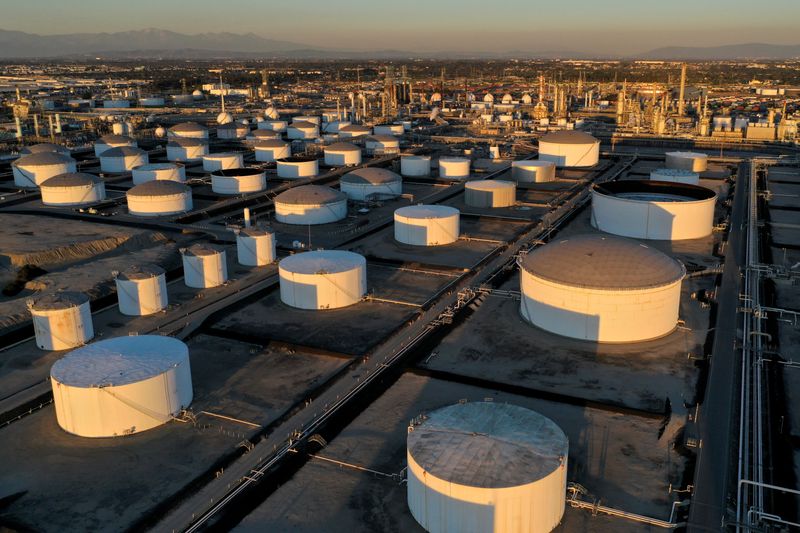

© Reuters. FILE PHOTO: Storage tanks are seen at Marathon Petroleum’s Los Angeles Refinery, which processes domestic & imported crude oil into California Air Resources Board (CARB) gasoline, CARB diesel fuel, and other petroleum products, in Carson, California, U.S.
By Florence Tan
SINGAPORE (Reuters) – Oil prices rose on Friday on expectations of lower Russian crude exports from the Baltic region in December, offsetting worries that a looming Arctic storm across the United States could snuff out transport fuel demand growth this holiday season.
rose 88 cents, or 1.1%, to $81.86 a barrel by 0148 GMT, while U.S. West Texas Intermediate crude was at $78.41 a barrel, up 92 cents, or 1.2% higher.
Russia’s Baltic oil exports could fall by 20% in December from the previous month after the European Union and G7 nations imposed sanctions and a price cap on Russian crude from Dec. 5, according to traders and Reuters calculations.
“Crude prices are higher as energy traders focus on Moscow’s response to the price cap put on Russian oil and not so much the thousands of flight cancellations that will disrupt holiday travel,” OANDA analyst Edward Moya said.
More than 4,400 U.S. flights have been cancelled over a two-day period due to the winter storm, coinciding with a holiday travel season that some predict could be the busiest ever.
On Thursday, oil prices on both sides of the Atlantic settled lower as flights were scrapped. The snow storm could also upend motorists’ plans to travel during Christmas and New Year, curbing gasoline consumption.
However, demand could be boosted as the extreme weather is expected to cause power outages.
“This Arctic storm will lead to many disappointed travellers, but shows that we are getting closer to normal travel behaviours,” Moya said.
Brent and WTI are on track to post a second weekly gain, supported by expectations of an eventual rebound in oil demand at the world’s No. 2 consumer China.
However, surging COVID-19 cases in the mainland, concerns about further rate hikes globally and recession curbing fuel consumption limited oil price gains.
“The oil market’s biggest wildcard is China and optimism is still strong that the reopening will continue and eventually lead to more demand,” Moya said.






